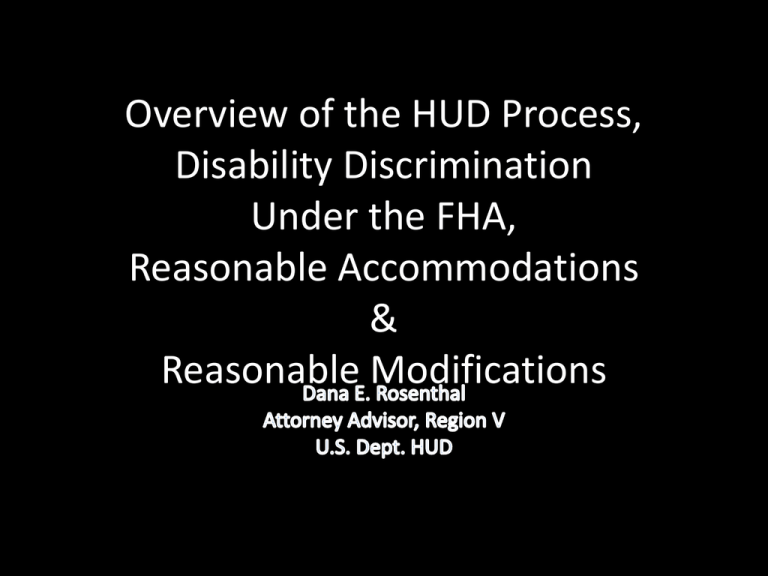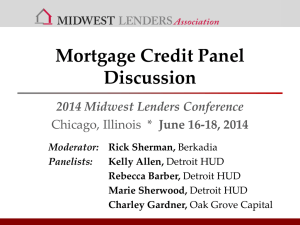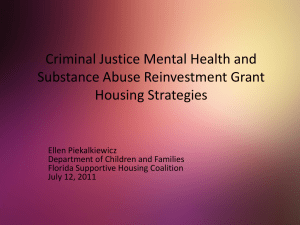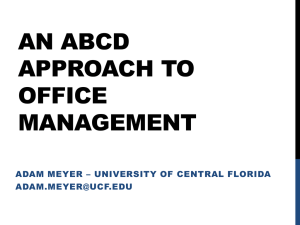HUD Powerpoint on Housing Discrimination 1-11
advertisement

Overview of the HUD Process, Disability Discrimination Under the FHA, Reasonable Accommodations & Reasonable Modifications Filing a Complaint: Timing • Must be filed with HUD within 1 year after the discriminatory housing practice has occurred or terminated. See 42 U.S.C. §3610(a) or • May commence a civil action in district court or state court not later than 2 years after the occurrence or the termination of a discriminatory housing practice. See 42 U.S.C. §3613(a)(1)(A). • Computation of the 2 year period shall not include any time during which a complaint was pending with HUD. Filing a Complaint: Resources • 24 C.F.R. Part 103 Fair Housing Complaint Processing. • Toll Free Call to 1800-669-9777 or TTY 1800-927-9275 • On-line complaint form available at http://www.hud.gov, or • Via mail: Office of Fair Housing and Equal Opportunity Department of Housing and Urban Development 451 Seventh Street, S.W. Room 5204 Washington, DC 20410-2000 Complaints • Complaints can be filed when someone has been injured by a discriminatory housing practice or when someone believes that they will be injured by a discriminatory housing practice that is about to occur. • A narrative of what occurred should be prepared when the complaint is filed. This is a chance to frame the issue and put forth essential facts. Investigation • Once the complaint is filed an investigation will be initiated through the Office of Fair Housing and Equal Opportunity. • The investigation is done impartially, and it is the purpose to 1. obtain information regarding the events that relate to the alleged discriminatory housing practice, 2. document policies or practices of the Respondent/s, and 3. develop factual data so that a determination of reasonable cause or no reasonable cause can be made. • The Assistant Secretary of HUD may also initiate investigations to determine whether a complaint should be filed. (ie, most recently in HUD v. Castillo.) Investigation Process • Respondents are asked to provide an answer to the complaint. • Respondents are able to assert defenses to the allegations alleged in the complaint. • HUD seeks voluntary cooperation from all persons re: obtaining access to premises, records, persons to take statements from to further the investigation. • HUD may conduct and order discovery as provided at 24 C.F.R. Part 180, and the Asst Sec. has the power to issue subpoenas. Investigation Process • The Asst. Sec. will complete the investigation within 100 days of the filing of the complaint UNLESS it is impracticable to do so. • At the end of the investigation a Final Investigative Report (“FIR”) is prepared that contains the findings from the investigation minus anything that must remain confidential. • Upon completion of the investigation, the respondents and complainants are entitled to a copy of the FIR upon their request. Conciliation • Once the complaint is filed up until the filing of the charge or dismissal, HUD will attempt conciliation of the case. • If conciliation is successful, HUD will prepare a conciliation agreement with the terms of the settlement. • Types of relief include: monetary damages including humiliation and attorney fees, equitable relief, which may include access to services or part of the premises, and injunctive relief, which stops the practice in question. • discussions that are part of conciliation will remain confidential. See 24 C.F.R. §103.330 Issuance of a Charge • If no reasonable cause found, then HUD will issue a no cause determination and dismiss the complaint. • If HUD finds that reasonable cause exists (with concurrence from OGC), it will issue such a determination and direct that OGC prepare a Charge of Discrimination. • Zoning and land use issues take a different route. Issuance of a Charge • Once a charge is filed the parties have the option to elect to federal court. See 24 C.F.R. §103.410. (20 days within which to make an election) • If no election is made the case will stay in the administrative forum with a HUD attorney representing the public interest. – The procedures at 24 C.F.R. Part 180 will govern. • The complainant/aggrieved persons will have the option to intervene on their own behalf. Issuance of a Charge • If a party elects to federal court, HUD will notify the DOJ to commence a civil action under 42 U.S.C. §812. – The DOJ will then represent the complainant or aggrieved person on behalf of the public interest. – Again the complainant/aggrieved person will be able to intervene on their own behalf. – Pros and cons of the decision whether to elect or not will be explained to the parties by HUD. Rocket Docket and Relief • The Act calls for expedited discovery and hearing. See 42 U.S.C. §3612(d). • ALJs must commence a hearing under the Act no later than 120 days following the issuance of the Charge UNLESS it is impracticable to do so. • The Administrative process allows for: actual damages, injunctive or other equitable relief, and civil penalties that are prescribed by the Act itself. See 42 U.S.C. §3612(g). • Attorney’s Fees: Prevailing party (not U.S.) may get reasonable attorney’s fees and costs. See 42 U.S.C. §3612(p). The FHA Disability as a Protected Class The FHA and Disability • Comprises over 40% of the cases HUD receives. • The 1988 Amendments Act added disability as a protected class. – Defined disability broadly – Added disability to almost all the Act’s existing provisions – Prohibits disability related inquiries – Adding three special provisions: modification, accommodation and design and construction. Definition of Disability • A physical or mental impairment that substantially limits one or more of a person’s major life activities, a record of having such an impairment, or being regarded as having such an impairment. See 42 U.S.C. §3602(h). – Definition does not include current illegal use of or addiction to a controlled substance. – Does not apply to an individual solely because that individual is a transvestite. Disability as a Protected Class • Reverse discrimination suits not allowed with disability. • 42 U.S.C. §3604(f)(1) to discriminate in the sale or rental, or otherwise make unavailable or deny a dwelling because of disability. • 42 U.S.C. §3604(f)(2) to discriminate in the terms conditions or privileges or in the provisions of services or facilities in connection with because of disability. – Cover not just disabled home seekers but nondisabled who reside or are associated with people with disabilities. – These 2 provisions are augmented by 42 U.S.C. 3604(f)(3)(A)-(C). Reasonable Accommodation and Modification • • • ACCOMMODATION: to refuse to make a reasonable accommodation to rules, policies, practices or services, when such accommodation may be necessary to afford such person equal opportunity to use and enjoy a dwelling. See 42 U.S.C. §3604(f)(3)(B) • • • MODIFICATION: a refusal to permit, at the expense of the disabled person, reasonable modifications of existing premises occupied or to be occupied by such person if such modification may be necessary to afford such person full enjoyment of the premises, except that in the case of a rental, the landlord may where it is reasonable to do so condition permission for a modification on the renter agreeing to restore the interior of the premises to the condition that existed before the modification, reasonable wear and tear excepted. See 42 U.S.C. §3604(f)(3)(A) Reasonable Modifications • Request may be made at any time during the tenancy. • Cost on the renter/tenant – maintenance issues depends. • Housing Provider may request: – a reasonable description of the proposed modification, and – reasonable assurance that the work will be done in a workmanlike manner, and – Any required building permits will be obtained by the pwd/renter. • In rental situation, HP may request that interior modifications be restored minus normal wear and tear, where it is reasonable to do so. (ie, remove grab bars=reasonable, narrow doorway= not reasonable). • Interest bearing escrow accounts possible on case by case basis. Reasonable Accommodations • Can be its own theory of liability • Feasible, practical modifications must be made UNLESS undue hardship, admn burden, or fundamental alteration in the program. • Highly fact specific requires case by case determination • HP may have to incur costs as long as not unduly burdensome Theories of Discrimination • Direct – Where the policy, rule or declaration is discriminatory on its face against individuals with disabilities, do NOT need to engage in a prima facie analysis or request reasonable accommodation of that policy. See, U.S. v. Rathbone Retirement Comm., et al.,3:08-cv-00174 (N.D. Ind. 2009). • Disparate Impact • Reasonable Accommodation – Wisconsin Comm. Servs. v. City of Milwaukee, 413 F.3d 642, vacated, rehearing en banc granted, reversed and remanded, 465 F.3d 737 (7th Cir. 2006). Prima Facie Elements. •Disabled within the meaning of the Act. •Housing provider knew or should have known of the disability. See, Jankowski Lee & Assoc. v. Cisneros, 91 F.3d 891, 19 A.D.D. 619 (7th Cir. 1996). •Requested a reasonable accommodation or modification. •Accommodation or modification was reasonable and necessary to offer disabled person equal opportunity to use and enjoy the dwelling. Dadian v. Village of Wilmette, 269 F.3d 831, 12 A.D. Cas. (BNA) 609 (7th Cir. 2001). •Accommodation or Modification denied or so delayed as to equate to denial. CRITICAL ELEMENTS OF THE CLAIM: •Interactive Process See, Jankowski Lee & Assoc. v. Cisneros, 91 F.3d 891, 19 A.D.D. 619 (7th Cir. 1996).* (some circuits) • Necessity and Burden Shifting Bronk v. Ineichen- 54 F.3d 425 (7th Cir. 1995) necessity-must ameliorate in some way the effects of the disability. ANOTHER CRITICAL ELEMENT: •Reasonableness burden of proof that there is a nexus between the requested accommodation and the disability. See argument in, Giovani v. Housing Authority of Lake County (N.D. IL 2009), and Giebeler v. M & B Assocs., 343 F.3d 1143 (9th Cir. 2003). Contrast to economic accommodations rejected in Salute v. Stratford Greens Garden Apts., 136 F.3d 293 (2nd Cir. 1998), Hemisphere v. Village of Richton Park, 171 F.3d 437, 440 (7th Cir. 1999). Evidence of Disability •Inquiry is permitted to the extent that it is needed to evaluate the reasonable accommodation or modification request •Balance the need to evaluate reasonable accommodation requests of tenants who refuse to disclose the nature of their disabilities with legitimate privacy issues. Defenses •Undue fiscal & administrative burden. •Fundamental Alteration of the Program. •Health & Safety-Direct threat- Housing provider is not required to permit accommodations or modifications that would present a direct threat to the health and safety of others or substantial physical damage to the property of others. DIRECT THREAT •A dwelling need not be made available to an individual whose tenancy would constitute a direct threat to the health or safety of other individuals or whose tenancy would result in substantial physical damage to the property of others. 42 U.S.C. §3604(f)(9) •Can’t be based on stereotypes, fears or prejudices. •Must relate to the particular abilities of the disabled individual. •Must be established by objective evidence. Fair Housing; Implementation of the Fair Housing Amendments Act of 1988, 53 Fed. Reg. 44992, 45002 (1988). •Defense is only available where the threat cannot be ameliorated by a reasonable accommodation. • Sometimes there’s an affirmative obligation to accommodate. Some cases have held that a housing provider must attempt to accommodate a direct threat before evicting. Groner v. Golden Gate Gardens Apts., 250 F.3d 1039, 2001 FED App. 0174P (6th Cir. 2001); Roe v. Sugar River Mills Assoc. 820 F. Supp. 636 (D.N.H., 1993), Roe v. Housing Authority of the City of Boulder, 909 F. Supp. 814 (D. Colo., 1995). New Developments of Interest • New Administration focus on Affirmatively Furthering Fair Housing. See 42 U.S.C. §3608(e)(5). • Recent DOJ settlement and HUD cases Alphabet Soup Cautionary Notes. Upcoming Reasonable Accommodation Reasonable Modification problems based on new housing types. •The plan for transformation has resulted in a number of different housing types that didn’t exist previously. •Many people with disabilities were vouchered out of their housing and now live in the community, rather than in traditional public housing units. that can be accessed by people with disablities who lose this benefit upon moving. • Affirmatively Furthering Fair Housing. Many communities are seeking to reduce or eliminate the number of traditional public housing units and project based units in their communities, primarily using funds for vouchers. •Tax Credits. Many communities are leveraging their financing through state programs and tax credits. Tax credits are not considered federal financial assistance for purposes of triggering Section 504 of the Rehab Act. •New HUD initiative to bring HUD funding under one process QUESTIONS









